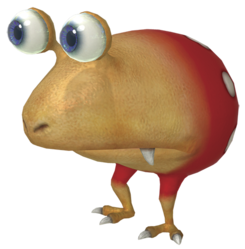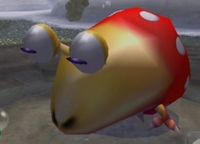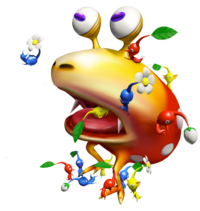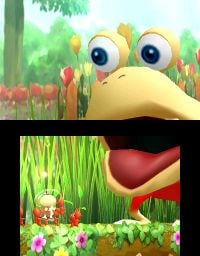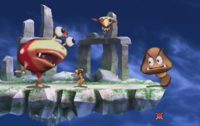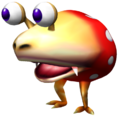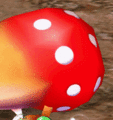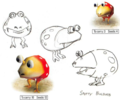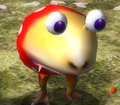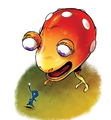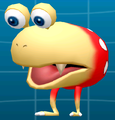Bulborb: Difference between revisions
(Undo; That can wait.) Tag: Undo |
Trig Jegman (talk | contribs) mNo edit summary |
||
| Line 339: | Line 339: | ||
==Trivia== | ==Trivia== | ||
*On the [[title screen]] of {{p2}}, pressing {{button|gc|x|wii|1}} will summon a Bulborb onto the screen. The player can control it by using {{button|gc|c|wii|pad}} and can eat Pikmin using {{button|gc|z|wii|z}}. | *On the [[title screen]] of {{p2}}, pressing {{button|gc|x|wii|1}} will summon a Bulborb onto the screen. The player can control it by using {{button|gc|c|wii|pad}} and can eat Pikmin using {{button|gc|z|wii|z}}. | ||
*In the North American and Japanese version of | *In the North American and Japanese version of ''[[New Play Control! Pikmin]]'', the sample rate for the Bulborb's sounds were set incorrectly causing them to make whistling and squeaking like sounds rather than their distinctive cries.{{cite youtube|3m_j0UFlbog|where the start explains that the sounds are broken|published={{date|30|November|2019}}|retrieved={{date|4|July|2022}}}} This bug has caused some players to think that the sounds of a Bulborb were replaced by mouse squeaks. | ||
*If a [[bomb rock]] is planted near a Bulborb, the noise produced by the explosion will wake it up. | *If a [[bomb rock]] is planted near a Bulborb, the noise produced by the explosion will wake it up. | ||
*The ''Brawl'' trophy game appearance section claims that the Bulborb first makes an appearance in {{p2}}. This is [[Mistake|incorrect]], as the enemy is present in the [[Pikmin (game)|first game]] as well. The only part about the trophy that debuted in ''Pikmin 2'' is the name "Bulborb" – this enemy was known as "Spotty Bulborb" prior to that game. | *The ''Brawl'' trophy game appearance section claims that the Bulborb first makes an appearance in {{p2}}. This is [[Mistake|incorrect]], as the enemy is present in the [[Pikmin (game)|first game]] as well. The only part about the trophy that debuted in ''Pikmin 2'' is the name "Bulborb" – this enemy was known as "Spotty Bulborb" prior to that game. | ||
Revision as of 23:29, February 16, 2023
- This article is about the red grub-dog. For other uses, see Bulborb (disambiguation).
Bulborbs (チャッピー?, lit.: "Chappy") are the most common, standard, and well-known enemies in the Pikmin games. They were originally called Spotty Bulborbs in Pikmin, and then Red Bulborbs in Pikmin 2, before being simply called Bulborbs in Pikmin 3 and later games. Due to their unparalleled prominence in the series as enemies, they are often just as much a staple for the games as the Pikmin and Olimar, getting significant exposure via marketing and spin-off media.
Stats
|
The following article or section is in need of assistance from someone who plays Hey! Pikmin. |
| Game | Weight | Max. carriers |
Seeds | Value | Health | Regen. |
|---|---|---|---|---|---|---|
| 10 | 20 | 12 | N/A | 1100 | Unknown | |
| 10 | 20 | 12 | 750 | No | ||
| 10 | 20 (normally) | 10 | 1000 | No | ||
| N/A | N/A | N/A | Unknown | Unknown |
Behavior
Bulborbs are nocturnal creatures, and sleep in open locations during the day. In the main series of games, this exposes them to being attacked by Pikmin, as they won't wake up until they are attacked. However, Dwarf Bulborbs in Pikmin will let out a screech when agitated, awakening any nearby Bulborbs.
Once awake, they become aggressive, and will run towards nearby Pikmin and lunge at them to try and eat them. If it manages to catch any Pikmin, it will stand up and eat them; otherwise it will try again. If there are a lot of Pikmin attacking it at once, it will shake them off and then start trying to eat again. If their eyestalks are attacked, they will panic and break off whatever they are doing to shake away their assailants.
In Hey! Pikmin, a Bulborb takes on the role of the boss of the Brilliant Garden. It is larger and moves slower, but is also more aggressive, and is no longer nocturnal. When defeated, it drops the Flashy Monument.
Locations
- See: Bulborb/Locations
Strategy
|
The following article or section contains guides. |
Pikmin
Swarming a Bulborb with a large group of 50 or so Pikmin, preferably Red Pikmin due to their increased attack power, proves quite effective most of the time. If only a few Pikmin are available, they should be thrown onto the Bulborb's back repeatedly while retreating if the enemy starts charging at them. Waiting until it goes back to sleep takes longer, but is a lot safer. If bomb-rocks are used, the Bulborb will die with two blasts. If you attack its back it will usually do a quarter-turn right, hiding some of its back from your current position.
Pikmin 2
Rather than swarming it, continuously tossing Pikmin onto its back is preferable when the army is at least 30 Pikmin strong, even if some are shaken off. A few Purple Pikmin can cause serious damage, especially if they stun the Bulborb. If it is accidentally awakened before being attacked by Pikmin, you should run away until it turns around, then make a new pass at it.
If the Pikmin army is very small, the creature can also be woken up and made to chase the leader until it leaves its territory, at which point it will turn around and return to its original sleeping spot. At this point, the player must follow it and wait for it to reach its spot. Once there it will yawn, fall asleep, then wake up and attack again if provoked. Beginning the attack at the moment the creature yawns provides the player with a few crucial seconds in which the Bulborb is entirely immobilized and harmless.
In some metal-themed caves, Bulborbs can be led off of the stage by awakening it and quickly running around a hole in the sublevel, causing it to fall off.
Pikmin 3
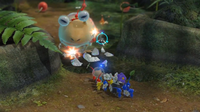
The first game's tactic of swarming the creature from behind returns in this game, though here it is far more effective. If the Pikmin charge at the creature's behind, they will flawlessly cling to it and continue attacking as it rises, making 20 Red Pikmin enough to take it down before it has any chance of resistance.
If it is awake, repeatedly throw Pikmin at its eyes, even when it's shaking in pain, and whistle them when they scatter around and you end up low on Pikmin to throw. You can also escape from a Bulborb by hiding under a tall plant.
Hey! Pikmin
In Hey! Pikmin, the Bulborb is a boss, and is fought in a standalone battle at The Shadow in the Brush. Olimar starts the fight with 20 Red Pikmin. The objective is to deplete the Bulborb's health by throwing Pikmin at its backside. If the Bulborb is facing towards Olimar, then wait for it to bend over and throw a Pikmin at its eye. This will stun it and give you time to run under it to the other side. Once on the other side, proceed to throw the Pikmin onto its vulnerable backside until it shakes them off. The Bulborb will periodically jump into the blades of grass in the backdrop and shuffle around in them until eventually popping back out at the last place Olimar was standing. The player can tell when it will jump out because right before it does it will rustle in a single place. If the Bulborb is attacked once it has shaken off any attacking Pikmin, then it'll slowly turn around to face the group, snarling aggressively, before swooping around once in a circle, attempting to snatch up any Pikmin. After it does this, it'll proceed to do its attack from the grass. While it is bending over, if Olimar or a Pikmin are in its line of sight it will run forward and attempt to eat them.
Biology
Bulborbs are among the creatures with the most diverse physiology in the Pikmin series. They possess traits similar to those of amphibians, reptiles, and mammals. They have large bulbous eyes set in stalks, as opposed to the compound eyes of most insects. These eyes are purple in Pikmin and Pikmin 2, but appear more anthropomorphic in Pikmin 3, with large black pupils and blue irises.
Olimar mentions the Bulborbs having a set of mandibles. Mandibles are a pair of appendages near an insect's mouth, used for grinding and chewing food. The so-called mandibles Olimar mentions in his notes look nothing like normal mandibles and are instead most likely saber-teeth, used for breaking exoskeletons of prey insects and digging through the soil for roots. (That being said, "mandible" is also a technical term for the jaws, in which case its use is unremarkable.) Their diet is, however, quite the mystery, as they are equipped with eating both animal and vegetable life, but they are known to fully ignore Spectralids.
It seems that the juvenile Bulborb is the favored host of the parasitic Pikmin known as Bulbmin. This type of Pikmin appears to control its host, causing the animal to behave less like a Bulborb and much more like a Pikmin, following a leader (which is naturally an older Bulbmin) and hunting in packs. Bulborbs are not observed at the two stages of development displayed by Bulbmin anywhere else in-game (unlike the Spotty Bulbear), so it is unknown whether Bulbmin are a common stage in Bulborb initial development or not, as symbiotic cooperation from the parasite would give this slightly weaker form of Grub-dog an advantage in the subterranean environment that all stages of the Bulborb species are found in.
Development history
Bulborbs were created before the concept for Pikmin was established. When a game called Adam and Eve was being worked on, the Bulborb had been created to serve as a mammoth-like beast. When the concept for the game was scrapped, the Bulborbs were reused for Pikmin. As clued by the internal name for this enemy and the Dwarf Bulborb, the Dwarf Bulborb may have possibly been the original Bulborb, and the Spotty Bulborb may have been created afterward in development. However, the "mammoth" properties of the beast, as mentioned by Shigeru Miyamoto, suggest that the first "Bulborb" creature to be developed was large, and hence, the Spotty Bulborb was likely the original, with the Dwarf Bulborb conceptually developed later as a smaller derivative.
Their name in Pikmin is "Spotty Bulborb", and at this point, only one type of Bulborb was planned to exist (besides the false variations of Bulborb, the Dwarf Bulborbs). For Pikmin 2, it was decided that further types of Bulborb would be developed, but because they would all be Bulborbs and have spots on their backs, the original one needed a rename. Due to it being red while the others are orange and hairy, the name "Red Bulborb" was given to this enemy.
For Pikmin 3, perhaps with the purpose to simplify things, its name became known simply as "Bulborb", despite two other types of Bulborb existing in the game: the Orange Bulborb and the Whiptongue Bulborb. In an attempt to flesh out this iconic enemy, its behavior was made slightly more complex in this game, in the form of it reacting to Pikmin thrown at its eyes with a flinch, and by looking at Pikmin while it chases them. These behaviors also happen with the other Bulborbs.
Notes
Olimar's voyage log
Reel notes
Olimar's notes
Louie's notes
Alph's comments
“Structural flaws: eyestalks, back
Weight: 10
“Structural flaws: eyestalks, back
Weight: 10
Brittany's comments
Charlie's comments
Louie's comments
Olimar's comments
“Bulborb
Oculus kageyamii russus
Grub-dog family
“Bulborb
Oculus kageyamii russus
Grub-dog family
Hey! Pikmin logs
Pikmin Official Player's Guide description
Pikmin 3 Nintendo Player's Guide
Pikmin 3 website
Pikmin 3 Prima Guide
In the Super Smash Bros. series
|
This article or section is a short summary on the enemy in the Super Smash Bros. series. |
A Bulborb is the main stage hazard on the Distant Planet stage in Super Smash Bros. Brawl, Super Smash Bros. for Nintendo 3DS and Wii U, and Super Smash Bros. Ultimate. It is considerably larger than a Bulborb in the Pikmin series, and will periodically appear on the right side of the stage. It occasionally opens its mouth, and any fighters that fall in will be eaten and taken away, resulting in a KO.
In the Smash Run mode of Super Smash Bros. for Nintendo 3DS, a Bulborb appears as one of many enemies featured in the mode. It is one of the largest enemies in the game and has a comparable amount of knockback resistance. Its attacks are also deadly, KOing fighters with minimal effort.
A Bulborb also appears in the background of the Garden of Hope stage in Super Smash Bros. for Wii U and Ultimate, but its purpose is merely cosmetic. There is a sticker for a Bulborb in Super Smash Bros. Brawl, where it uses the final name "Bulborb".
Finally, a Bulborb also appears as a Spirit in Super Smash Bros. Ultimate's Spirit Mode. It can be evolved into the Empress Bulblax Spirit at level 99.
Brawl trophy
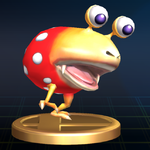
|
Description:
“A creature whose Japanese name translates as "spotted crimson bug-eye." These bulky nocturnal animals have white-and-red-flecked rumps that resemble strawberries. Red bulborbs sleep in the day and wake in the evening to feed on small animals. Several colors of bulborb subspecies have been discovered—their classification is a hot subject for scholars. | |
| How to obtain: Random appearance. | Type: Stage | |
Smash 4 trophy
- 3DS
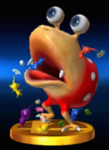
|
“These creatures from the Pikmin series have snail-like protruding eyes, huge mouths, and really bad tempers. They're known for snapping at fighters and trying to trample them underfoot. If you see one in a group of enemies, you should try to take it out fast—it'll shoot off and bounce around, hitting other enemies as it goes!”
| |
“These creatures from the Pikmin series have snail-like protruding eyes, huge mouths and really bad tempers. They're known for snapping at fighters and trying to trample them underfoot. If you see one in a group of enemies, you should try to take it out first – it'll shoot off and bounce around, hitting other enemies as it goes!”
| ||
| How to obtain: Random appearance. | Type: Enemy | |
- Wii U
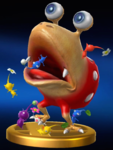
|
“These creatures from the Pikmin series have snaillike protruding eyes, huge mouths, and really bad tempers. Despite their cute appearance, they'll happily gobble up Pikmin! In Smash Bros., they appear on the Garden of Hope stage, wandering around or chasing the poor Pikmin. Thankfully, they don't seem interested in the fighters duking it out. | ||
“With their spotted backs and big round eyes, Bulborbs are almost cute. But don't be fooled! They have a voracious appetite, and will gladly eat as many Pikmin as they can get their tongues on. In this game, you might spot one in the Garden of Hope stage, getting in the Pikmin's way. Luckily, the Bulborbs won't bother you. Phew! | |||
| How to obtain: Random appearance. | Type: Stage | Trophy Box: 61. Distant Planet & Indigenous Creatures | |
Technical information
| Pikmin technical information (?) | |||
|---|---|---|---|
| Internal name | swallow
| ||
| HP | 1100 | ||
| Pikmin 2 technical information (?) | |||
|---|---|---|---|
| Internal name | chappy
| ||
| Global properties (List) | |||
| ID | Japanese comment | Property | Value |
| s000 | friction(not used) | Friction | 0.5 |
| s001 | wallReflection | Unknown (wall bounce speed multiplier?) | 0.5 |
| s002 | faceDirAdjust | Unknown | 0.25 |
| s003 | accel | Acceleration | 0.1 |
| s004 | bounceFactor | Unknown (bounce when it hits the ground?) | 0.3 |
| fp00 | ライフ | HP | 750 |
| fp01 | マップとの当り | Unknown (related to slopes) | 40 |
| fp02 | ダメージスケールXZ | Horizontal damage scale | 0.3 |
| fp03 | ダメージスケールY | Vertical damage scale | 0.3 |
| fp04 | ダメージフレーム | Damage scale duration | 0.35 |
| fp05 | 質量 | Unknown (weight?) | 0.1 |
| fp06 | 速度 | Move speed | 100 |
| fp08 | 回転速度率 | Rotation acceleration | 0.4 |
| fp09 | テリトリー | Territory radius | 400 |
| fp10 | ホーム範囲 | "Home" radius | 15 |
| fp11 | プライベート距離 | "Private" radius | 70 |
| fp12 | 視界距離 | Sight radius | 500 |
| fp13 | 視界角度 | FOV | 90 |
| fp14 | 探索距離 | Unknown (exploration radius?) | 500 |
| fp15 | 探索角度 | Unknown (exploration angle?) | 90 |
| fp16 | 振り払い率 | Successful shake rate | 1 |
| fp17 | 振り払い力 | Shake knockback | 120 |
| fp18 | 振り払いダメージ | Shake damage | 1 |
| fp19 | 振り払い範囲 | Shake range | 40 |
| fp20 | 攻撃可能範囲 | Unknown (shock attack max range?) | 75 |
| fp21 | 攻撃可能角度 | Unknown (shock attack max angle?) | 25 |
| fp22 | 攻撃ヒット範囲 | Unknown (attack hit range?) | 80 |
| fp23 | 攻撃ヒット角度 | Unknown (attack hit angle?) | 35 |
| fp24 | 攻撃力 | Attack damage | 10 |
| fp25 | 視界高 | Unknown (height visibility?) | 50 |
| fp26 | 探索高 | Unknown (exploration height?) | 50 |
| fp27 | ライフの高さ | HP wheel height | 90 |
| fp28 | 回転最大速度 | Rotation speed | 4 |
| fp29 | 警戒時間 | Unknown (warning time?) | 7 |
| fp30 | 警戒ライフ | Unknown | 30 |
| fp31 | ライフ回復率 | Regeneration rate | 0 |
| fp32 | LOD半径 | Off-camera radius | 40 |
| fp33 | マップとのあたりポリゴンの選定 | Collision processing radius | 50 |
| fp34 | ピクミンとのあたり | Pikmin damage radius | 30 |
| fp35 | 石化時間 | Petrification duration | 1 |
| fp36 | ヒップドロップダメージ | Purple Pikmin drop damage | 50 |
| fp37 | 地震気絶確立 | Purple Pikmin stun chance | 0.3 (30%) |
| fp38 | 地震気絶時間 | Purple Pikmin stun time | 5 |
| ip01 | 振り払い打撃A | Shake mode 1 – hit count | 6 |
| ip02 | 振り払い張付1 | Shake mode 1 – Pikmin requirement | 5 |
| ip03 | 振り払い打撃B | Shake mode 2 – hit count | 12 |
| ip04 | 振り払い張付2 | Shake mode 2 – Pikmin requirement | 10 |
| ip05 | 振り払い打撃C | Shake mode 3 – hit count | 17 |
| ip06 | 振り払い張付3 | Shake mode 3 – Pikmin requirement | 20 |
| ip07 | 振り払い打撃D | Shake mode 4 – hit count | 22 |
| Specific properties | |||
| ID | Japanese comment | Property | Value |
| fp01 | 足元範囲 | Unknown (foot range?) | 30 |
| fp02 | 白ピクミン毒 | White Pikmin poison damage | 750 |
| Pikmin 3 technical information (?) | |
|---|---|
| Internal name | chappy
|
| HP | 1000 |
| Rock Pikmin throw hits to kill | 25 |
| White Pikmin ingestions to kill | 5 |
| Bomb rock explosions to kill | 1 |
| Bomb rock ingestions to kill | 1 |
| Number of direct hits on top to kill | 0 |
| Damage to leaders | 20 |
| Territory radius | 300 |
| Mission Mode value | 50 |
|
The following article or section is in need of assistance from someone who plays Hey! Pikmin. |
| Hey! Pikmin technical information (?) | |||
|---|---|---|---|
| Internal name | boss_chappy
| ||
| Generator name(s) | boss_chappy
| ||
Other information
- Technical name in The Official Nintendo Player's Guide: Greater Grub-Dog
- Size: Body length: 90mm, as per the e-card
- Pikmin 2 Piklopedia number: #1
Naming
- Common name: Bulborb. Its name is simplified to this as it's the most "basic" bulborb, compared to other ones; in fact, the alternative name "basic bulborb" is even used in Olimar's notes.[1] See here for details on the word "Bulborb". In Pikmin 2, it was called "Red Bulborb", referring to its primarily red coloration. The term "Spotty Bulborb" was initially used to refer to this enemy in Pikmin, until other types of Bulborbs were made for Pikmin 2. The "Spotty" in this name is due to the spots it has on its back.
- Japanese nickname: チャッピー?, or アカチャッピー?. Translate to "Chappy", or "Red Chappy". See here for details on the word "Chappy".
- Japanese name: ベニデメマダラ?. Translates to "Spotted Crimson Bug-eye", as pointed out by the Super Smash Bros. Brawl trophy.
- Scientific name: Oculus kageyamii russus. russus is Latin for "red". See here for details on the genus and species.
- Internal names: Its internal name in Pikmin is
swallow, given that the namechappyis already used by the Dwarf Bulborb. The internal name in Pikmin 2 and Pikmin 3 is alsochappy, the same as the Japanese name for Bulborb. Finally, in Hey! Pikmin, the enemy's internal and generator names are bothboss_chappy, the same as before, but now acknowledging that it is a boss. - Prerelease: In an early script left inside Pikmin 2, the creature used to have the technical name Oculus kageyamii ssp RED.[2] The "ssp RED" means "subspecies RED" and is presumably a placeholder used until a proper word for "red" was found.
Names in other languages
| Language | Name | Meaning | Notes |
|---|---|---|---|
| チャッピー (Pikmin 3) アカチャッピー (Pikmin 2)? Chappii Aka Chappii |
Chappy Red Chappy |
||
(traditional) |
恰比 Qiàbǐ |
Chappy | |
(simplified) |
恰比 Qiàbǐ |
Chappy | |
| Bulborb | - | ||
| Bulborbe (Pikmin 3) Bulborbe rouge (Pikmin 2) Bulborbe à pois (Pikmin) |
Bulborb Red Bulborb Spotty Bulborb |
||
| Punktkäfer (Pikmin 3) Roter Punktkäfer (Pikmin 2) |
Dot Beetle Red Dot Beetle |
||
| Coleto (Hey! Pikmin) Coleto Rosso (Pikmin 2) |
Red Coleto (Pikmin 2) | "Coleto" may come from "boletus" (Latin for mushroom), as a bulborb's spots resemble those found on certain mushrooms. | |
| 차피 Chappi |
Chappy | ||
| Olborbo | From "Bulborb", the masculine suffix -o, and possibly bolbo (bulb) or olho (eye) | Name taken from the Super Smash Bros. for Nintendo 3DS trophy. | |
| Bulbo (Pikmin 3) Bulbo rojo (Pikmin 2) |
Bulb Red bulb |
||
| Клубнеголов Klubnegolov |
From клубника klubnika (strawberry) and голова golova (head) | Name taken from Super Smash Bros. Ultimate spirit |
[[it:Coleto (Hey! Pikmin)
Coleto Rosso (Pikmin 2)]]
Gallery
Pikmin
The Bulborb in the enemy reel from Pikmin.
A dead Bulborb being carried off in an early version of Pikmin. Note how it is upside-down, unlike the final game, where it is simply slumped over.
Pikmin 2
A Bulborb in the Piklopedia.
The creature's e-card, #01 (2nd red card).
Pikmin 3
A Bulborb about to bite Alph.
Alph getting tossed onto a Bulborb. Note how the Bulborb woke up.
A Bulborb (on the left) burping after eating some Pikmin in Bingo Battle.
- Bulbsnot.jpeg
A Bulborb's snot bubble.
Pikmin 4
A Bulborb, frozen by Ice Pikmin.
Hey! Pikmin
Walking under the Bulborb in Hey! Pikmin.
In the Creature Log.
The Bulborb encounter in a prerelease version of Hey! Pikmin.
Other
A Bulborb, as it appears in Super Smash Bros. Brawl.
- See more: Bulborb images category.
Trivia
- On the title screen of Pikmin 2, pressing
 /
/  will summon a Bulborb onto the screen. The player can control it by using
will summon a Bulborb onto the screen. The player can control it by using  /
/  and can eat Pikmin using
and can eat Pikmin using  /
/  .
. - In the North American and Japanese version of New Play Control! Pikmin, the sample rate for the Bulborb's sounds were set incorrectly causing them to make whistling and squeaking like sounds rather than their distinctive cries.[3] This bug has caused some players to think that the sounds of a Bulborb were replaced by mouse squeaks.
- If a bomb rock is planted near a Bulborb, the noise produced by the explosion will wake it up.
- The Brawl trophy game appearance section claims that the Bulborb first makes an appearance in Pikmin 2. This is incorrect, as the enemy is present in the first game as well. The only part about the trophy that debuted in Pikmin 2 is the name "Bulborb" – this enemy was known as "Spotty Bulborb" prior to that game.
- In the Nintendogs games, at the second-hand shop, there is a Bulborb toy on a shelf of products in a pre-rendered background shot.
- Along with Captain Olimar, the Pikmin and Louie, the Bulborb is available as a plush toy, along with being a secret figurine in the first volume of Pikmin Figures.
- Before the Pikmin were even conceptualized, in the Adam and Eve prototype, the Bulborbs played a mammoth-like role, impeding on the player's village.
- The appearance of the Bulborb somewhat resembles that of the Super Mushroom from the Mario series. Both have generally bulbous sides, backs, and tops that are red with white spots. Likewise, the red and white spotted patterns of both are broken up by beige-colored fronts with two eyes.
- The Bulborb and the Hermit Crawmad are the only enemies in Pikmin 2 to have a clay figure modelled after them.
- It could be said that the Bulborb is what represents enemies in general in the Pikmin series, since it repeatedly appears as the icon whenever the game needs to refer to enemies: a stylized Bulborb icon is used to represent battle deaths in the day results menu of Pikmin 2 and the remaining enemy count in the Battle Enemies! mode of Pikmin 3, a Bulborb silhouette icon represents the Pokos earned through enemy bodies in the cave results menu of Pikmin 2 and is used to show how many enemies of a particular type have been killed in the Piklopedia of Pikmin 2, a Bulborb icon is used to represent the Piklopedias of both Pikmin 2 and Pikmin 3 Deluxe, Bulborb icons appear in the Game Hunter, Animal Annotator, and Blast Radius (silhouetted in this case) badge icons for completing tasks related to defeating enemies in Pikmin 3 Deluxe; Bulborbs and Bulborb variants appear as the most frequently seen enemy during day lift off cutscenes. Bulborbs also appear very prominently in concept art, franchise merchandise, and in crossovers involving the series (such as in the Super Smash Bros. series). This role as the standard, ubiquitous enemy, however, is instead fulfilled by the Mockiwi in Hey! Pikmin.
See also
References
- ^ “Bulborb
Oculus kageyamii russus
Grub-dog family
This large organism has the familiar mandibles and cranial morphology of the grub-dog family, as well as the characteristic bulging eyes. As with most grub-dogs, the creature's cranium comprises half of its total length and girth. Showing a scarlet abdomen with white spots, this creature is primarily nocturnal, choosing to prey upon smaller creatures returning to their nests. Originally classified as the spotty bulborb, further research has reclassified this species as the basic bulborb. Subspecies of varied colors have recently been discovered, but academics are divided into two rival camps over how to handle their classification.” – Captain Olimar in his entry on the Bulborb in Pikmin 3 Deluxe. - ^ Pikmin 2/Early English Script on The Cutting Room Floor
- ^ YouTube video where the start explains that the sounds are broken, published on November 30th, 2019, retrieved on July 4th, 2022
| Bosses | |
|---|---|
| Pikmin | |
| Pikmin 2 | |
| Pikmin 3 | |
| Pikmin 4 | |
| Hey! Pikmin | |
| Pikmin enemies |
|---|
| Pikmin 2 enemies |
|---|
| Pikmin 3 enemies |
|---|
| Hey! Pikmin enemies |
|---|
- Pikmin 1
- Pikmin 2
- Pikmin 3
- Pikmin 4
- Hey! Pikmin
- Grub-dog family
- Pikmin 1 enemies
- Pikmin 2 enemies
- Pikmin 3 enemies
- Pikmin 4 enemies
- Hey! Pikmin enemies
- Bosses
- Pikmin-eating enemies
- The Forest of Hope
- The Distant Spring
- Valley of Repose
- Awakening Wood
- Hole of Beasts
- Hole of Heroes
- Dream Den
- Garden of Hope
- Tropical Wilds
- Formidable Oak
- Brilliant Garden
- Super Smash Bros. series
